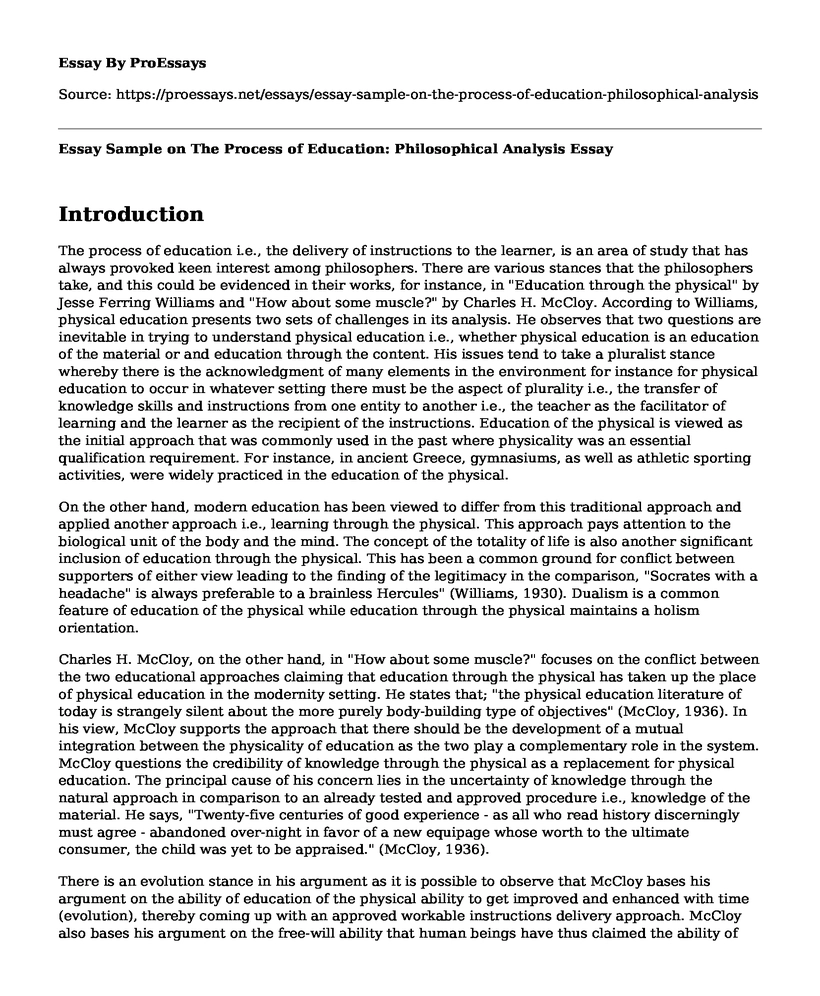Introduction
The process of education i.e., the delivery of instructions to the learner, is an area of study that has always provoked keen interest among philosophers. There are various stances that the philosophers take, and this could be evidenced in their works, for instance, in "Education through the physical" by Jesse Ferring Williams and "How about some muscle?" by Charles H. McCloy. According to Williams, physical education presents two sets of challenges in its analysis. He observes that two questions are inevitable in trying to understand physical education i.e., whether physical education is an education of the material or and education through the content. His issues tend to take a pluralist stance whereby there is the acknowledgment of many elements in the environment for instance for physical education to occur in whatever setting there must be the aspect of plurality i.e., the transfer of knowledge skills and instructions from one entity to another i.e., the teacher as the facilitator of learning and the learner as the recipient of the instructions. Education of the physical is viewed as the initial approach that was commonly used in the past where physicality was an essential qualification requirement. For instance, in ancient Greece, gymnasiums, as well as athletic sporting activities, were widely practiced in the education of the physical.
On the other hand, modern education has been viewed to differ from this traditional approach and applied another approach i.e., learning through the physical. This approach pays attention to the biological unit of the body and the mind. The concept of the totality of life is also another significant inclusion of education through the physical. This has been a common ground for conflict between supporters of either view leading to the finding of the legitimacy in the comparison, "Socrates with a headache" is always preferable to a brainless Hercules" (Williams, 1930). Dualism is a common feature of education of the physical while education through the physical maintains a holism orientation.
Charles H. McCloy, on the other hand, in "How about some muscle?" focuses on the conflict between the two educational approaches claiming that education through the physical has taken up the place of physical education in the modernity setting. He states that; "the physical education literature of today is strangely silent about the more purely body-building type of objectives" (McCloy, 1936). In his view, McCloy supports the approach that there should be the development of a mutual integration between the physicality of education as the two play a complementary role in the system. McCloy questions the credibility of knowledge through the physical as a replacement for physical education. The principal cause of his concern lies in the uncertainty of knowledge through the natural approach in comparison to an already tested and approved procedure i.e., knowledge of the material. He says, "Twenty-five centuries of good experience - as all who read history discerningly must agree - abandoned over-night in favor of a new equipage whose worth to the ultimate consumer, the child was yet to be appraised." (McCloy, 1936).
There is an evolution stance in his argument as it is possible to observe that McCloy bases his argument on the ability of education of the physical ability to get improved and enhanced with time (evolution), thereby coming up with an approved workable instructions delivery approach. McCloy also bases his argument on the free-will ability that human beings have thus claimed the ability of choice between the best-suited method that they may choose to deliver instructions to their kind. Although there may be contrasting opinions between Williams and McCloy, it is possible to identify that the two questions on the physicality of education remain as essential grounds in determining the concepts of physical education.
References
McCloy, C. H. (1936). How about some muscles?. The Journal of Health and Physical Education, 7(5), 302-355.
Williams, J. F. (1930). Education through the physical. The Journal of Higher Education, 1(5), 279-282.
Cite this page
Essay Sample on The Process of Education: Philosophical Analysis. (2023, Mar 27). Retrieved from https://proessays.net/essays/essay-sample-on-the-process-of-education-philosophical-analysis
If you are the original author of this essay and no longer wish to have it published on the ProEssays website, please click below to request its removal:
- Social Autobiography Annotated Bibliography
- "Second Language Education" Teaching Philosophy Essay
- Essay Example on No Degree? No Problem: You Can Be Successful
- Essay on Video Gaming: A Powerful Tool for Child Development?
- Early Childhood Education in America: Adapting for a Diverse Population - Essay Sample
- Paper Sample on Early Parental Influences Shape Young Person's Sports Experience
- Free Paper Sample on Overcoming Tragedy: My Story of Transformation







